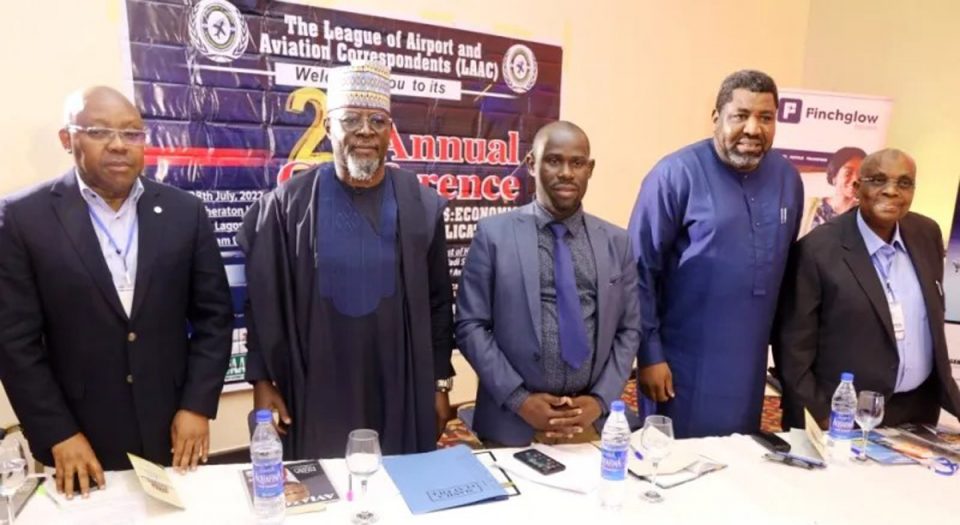Communique issued at the end of the 26th Conference of League of Airport and Aviation Correspondents (LAAC) Held at Sheraton Hotel, Ikeja, Lagos on Thursday, July 28, 2022
The well-attended physical and virtual conference, under the chairmanship of the Group Managing Director of Finchglow Holdings, Mr. Bankole Bernard, drew participants from all fingers of the aviation and allied sector.
Among them were the regulators, service providers, operators, ground handling companies, aviation enthusiasts, and members of the public.
The participants acknowledged challenges facing the global and local economies. They pointed at the cascading effects on the local aviation industry, as currently felt in airport infrastructure, airlines’ operations, hard-on effects on the travelling public and a bleak future for the sector.
Specifically, they decried foreign exchange liquidity crisis and its effects on the dollar-denominated aviation sector, attendant rising costs of fuel and operations, and one-too-many limiting factors of both airports’ and aircraft utilisation.
Participants observed that the notion of ‘Sunset Airports’ or limited (daylight) hours of operations is a self-limiting factor that is retrogressive and a challenge that should be addressed by a modern state.
The phenomenon is a major disrupter of the economies of airline operation and utilisation of aircraft assets. The self-imposed limitation was identified as one of the main banes of gross under-utilisation of aircraft, estimated to cost each airplane three hours of operation daily and at least N4.3billion worth of unearned revenue yearly (per equipment).
The untapped revenue gets bigger in an airline that has five or more aircraft and the reason local airlines battle survivability unlike their counterparts in Europe, North America and Asia.
Participants noted that the sunset airports actually have navigational aids, Instrument Landing Systems (ILSs), airfield lightings and so on to safely operate round the clock. They noted that there are other variables that define the operating hours of an airport, which include the passenger traffic demand and the cost of operations.
Regulators and service providers were unanimous that there are several airports that do not have daily flights. Therefore, it is uneconomical to keep them running without traffic demand, despite the high cost of energy, inadequate technical workforce and lack of support services to transport travellers beyond the airport at night. They, however, noted that extended operating hours are available at most airports, especially for airlines that are willing to pay for the extra service.
The participants also agreed on the imperative of maximum usage of airport facilities through deliberate triggers to draw traffic both to the airports and the operating airlines. Of consideration was the need to develop non-aeronautical sources of revenue around the facilities.
Also, the intentionality of policy re-direction for the sector to harmonise aviation financing with its safety and security elements. In turn, it will deepen collaboration between the regulator, service providers and operators, and enhance growth.
Lastly, they agreed that the industry would gravitate towards growth, if regulators, operators and other players ramp up efforts to implement the many policies and programmes already in place.
*The conference, therefore, recommended as follows:*
- More than ever before, the industry urgently needs a clearer vision and bold leadership that will think outside the box to rescue it from impending implosion. The way for recalibration is to redirect policies to see aviation as a basic essential service industry to the general public, rather than the pastime of the elites. That is, to have the aviation industry properly tied to the economy, and treat its limiters as national economic emergencies.
- A call for better collaboration among policymakers, regulators, service providers and operators, to work out viable and sustainable aviation development programmes that properly incorporate aviation financing with its safety and security elements. It is time to have a Bank of Aviation that is owned by investors and stakeholders. The ministries of aviation and finance should work with the CBN to make the currency of aviation available and accessible to those that need it.
- Sunset airport phenomenon and restriction in operating hours should henceforth be treated as an aberration and a problem to tackle, given their dire impacts on airlines and the economy at large. Airports that are designed and equipped for optimum services must stop operating at minimum levels. They should either operate optimally or shut down. Approved master plan of airports should be part of their regulations, and should be made illegal to go beyond the approved limits.
- Airports, like airlines, should be categorised according to their operating capacity and requirements for such services. In a demand-driven sector, airport managers should consider gradual, but steady extension of operating hours beyond daylight in airports where 24-hour operation is not yet feasible. Airline operators, through the Airline Operators of Nigeria (AON), should as well negotiate for service-hour extensions at specific airports to accommodate travel demands. The Nigerian Airspace Management Agency (NAMA) should embrace liberal policies that allow non-staffers to acquire capacity in aeronautical services and be eligible to fill gaps in the sector.
- There must be concerted efforts at all levels to steadily maximise aeronautical and non-aeronautical services around airports to grow the immediate and larger economy. Besides passenger services, there are other complementary services like cargo, tourism, hospitality, and others that must be invested in to maximise aviation potential.




